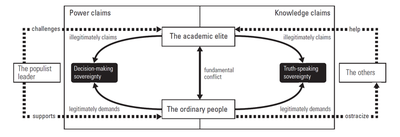Science-related populism: Conceptualization, empirical investigation, and implications for science communication (Dissertation Summary)
Abstract
Populist criticism has become a significant challenge for science and science communication. Such criticism maintains that allegedly corrupt academic elites and their expertise are inferior to allegedly virtuous “ordinary people” and their common sense. It suggests that the people, rather than elites, should have authority over how “true knowledge” is produced and communicated. This dissertation provides a conceptual and empirical analysis of populist science criticism against the backdrop of science communication scholarship and practice. It develops a theoretical framework for populist demands toward science, conceptualizing them as science-related populism. It also introduces a novel measure to investigate science-related populism in surveys – the SciPop Scale – and provides empirical evidence on populist science criticism in Switzerland and beyond. Moreover, the dissertation discusses implications of science-related populism for public discourse about science as well as science communication practice and proposes ways to respond to it.

Extended model of science-related populism.